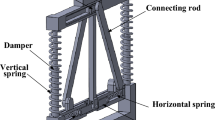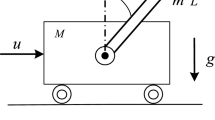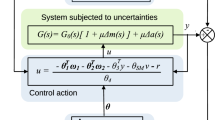Abstract
In this paper, an adaptive sliding mode technique based on a fractional-order (FO) switching-type control law is designed to guarantee robust stability for uncertain 3D FO nonlinear systems. A novel FO switching-type control law is proposed to ensure the existence of the sliding motion in finite time. Appropriate adaptive laws are shown to tackle the uncertainty and external disturbance. The calculation formula of the reaching time is analyzed and computed. The reachability analysis is visualized to show how to obtain a shorter reaching time. A stability criterion of the FO sliding mode dynamics is derived based on indirect approach to Lyapunov stability. Advantages of the proposed control scheme are illustrated through numerical simulations.











Similar content being viewed by others
References
Podlubny, I.: Fractional Differential Equations. Academic Press, New York (1999)
Ahn, H.S., Chen, Y.Q.: Necessary and sufficient stability condition of fractional-order interval linear systems. Automatica 44, 2985–2988 (2008)
Li, Y., Chen, Y.Q., Podlubny, I.: Mittag–Leffler stability of fractional order nonlinear dynamic systems. Automatica 45, 1965–1969 (2009)
Maione, G.: Conditions for a class of rational approximants of fractional differentiators/integrators to enjoy the interlacing property. In: Proceeding of the 18th IFAC World Congr, 18, 13984–13989 (2011)
Trigeassou, J.C., Maamri, N., Sabatier, J., Oustaloup, A.: State variable and transients of fractional order differential systems. Comput. Math. Appl. 64(10), 3117–3140 (2012)
Li, C., Ma, Y.: Fractional dynamical system and its linearization theorem. Nonlinear Dyn. 71, 621–633 (2013)
Maione, G.: On the Laguerre rational approximation to fractional discrete derivative and integral operators. IEEE Trans. Automat. Control 58, 1579–1585 (2013)
Sun, H., Chen, W., Chen, Y.Q.: Variable-order fractional differential operators in anomalous diffusion modeling. Phys. A 388(21), 4586C92 (2009)
Machado, J.A.T.: Fractional order modelling of fractional-order holds. Nonlinear Dyn. 70, 789–796 (2012)
Monje, C.A., Chen, Y.Q., Vinagre, B.M., Xue, D., Feliu, V.: Fractional order Systems and Controls: Fundamentals and Applications. Springer, London, New York (2010)
Luo, Y., Chen, Y.Q., Pi, Y.: Experimental study of fractional order proportional derivative controller synthesis for fractional order systems. Mechatronics 21, 204–214 (2011)
Yin, C., Stark, B., Chen, Y.Q., Zhong, S.M.: Adaptive minimum energy cognitive lighting control: integer order vs fractional order strategies in sliding mode based extremum seeking. Mechatronics 23, 863–872 (2013)
Li, R., Chen, W.: Lyapunov-based fractional-order controller design to synchronize a class of fractional-order chaotic systems. Nonlinear Dyn. 76, 785–795 (2014)
Yin, C., Chen, Y.Q., Zhong, S.M.: Fractional-order sliding mode based extremum seeking control of a class of nonlinear system. Automatica 50, 3173–3181 (2014)
Utkin, V.I.: Sliding Modes in Control and Optimization. Springer, New York (1992)
Liu, J.K., Wang, X.H.: Advanced Sliding Mode Control for Mechanical Systems: Design, Analysis and MATLAB Simulation. Springer, Tsinghua University Press, Berlin, Beijing (2012)
Tavazoei, M.S., Haeri, M.: Chaotic attractors in incommensurate fractional order systems. Phys. D 237, 2628–2637 (2008)
Hosseinnia, S.H., Ghaderi, R., Ranjbar, N.A., Mahmoudian, M., Momani, S.: Sliding mode synchronization of an uncertain fractional order chaotic system. Comput. Appl. Math. 59, 1637–1643 (2010)
Odibat, Z.M.: Adaptive feedback control and synchronization of non-identical chaotic fractional order systems. Nonlinear Dyn. 60, 479–487 (2010)
Tavazoei, M.S., Haeri, M.: Synchronization of chaotic fractional-order systems via active sliding mode controller. Phys. A 387, 57–70 (2008)
Wang, X., Zhang, X., Ma, C.: Modified projective synchronization of fractional-order chaotic systems via active sliding mode control. Nonlinear Dyn. 69, 511–517 (2012)
Yin, C., Zhong, S., Chen, W.: Design of sliding mode controller for a class of fractional-order chaotic systems. Commun. Nonlinear Sci. Numer. Simul. 17, 356–366 (2012)
Zhang, R., Yang, S.: Robust synchronization of two different fractional-order chaotic systems with unknown parameters using adaptive sliding mode approach. Nonlinear Dyn. 71, 269–278 (2013)
Yin, C., Dadras, S., Zhong, S., Chen, Y.Q.: Control of a novel class of fractional-order chaotic systems via adaptive sliding mode control approach. Appl. Math. Modell. 37(4), 2469–2483 (2013)
Tian, X., Fei, S.: Robust control of a class of uncertain fractional-order chaotic systems with input nonlinearity via an adaptive sliding mode technique. Entropy 16, 729–746 (2014)
Aghababa, M.P.: A novel terminal sliding mode controller for a class of non-autonomous fractional-order systems. Nonlinear Dyn. 73, 679–688 (2013)
Efe, M.: Fractional fuzzy adaptive sliding-mode control of a 2-DOF direct-drive robot arm. IEEE Trans. Syst. Man Cybern. Part B Cybern. 38, 1561–1570 (2008)
Yin, C., Stark, B., Chen, Y.Q., Zhong, S.M., Lau, E.: Fractional-order adaptive minimum energy cognitive lighting control strategy for the hybrid lighting system. Energy Build. 87, 176–184 (2015)
Yin, C., Chen, Y.Q., Zhong, S.M.: Fractional-order power rate type reaching law for sliding mode control of uncertain nonlinear system. In: Proceeding of 19th International Federation of Automatic Control World Congress, Cape Town, South Africa, 5369–5374 (2014)
Trigeassou, J.C., Maamri, N., Sabatier, J., Oustaloup, A.: A Lyapunov approach to the stability of fractional differential equations. Signal Process. 91, 437–445 (2011)
Author information
Authors and Affiliations
Corresponding author
Additional information
This work was supported by National Basic Research Program of China (Nos. 61462065 and 51407024) and ZYGX2015KYQD020.
Appendix: Proof of Lemma 2.1
Appendix: Proof of Lemma 2.1
For \(\forall t > 0\), there exists a time interval \((t_k,t_{k + 1} ]\) such that \(t \in (t_k,t_{k + 1} ]\) and \(\sigma (t')\ge 0, \forall t' \in (t_k,t_{k + 1} ]\) if \(\sigma (t)>0\), or \(\sigma (t') \le 0, \forall t'\in (t_k,t_{k + 1} ]\) if \(\sigma (t)<0\). Furthermore, there exists a finite partition given by \( 0=t_0<t_1<t_2<\cdots <t_{k-1 } < t_{k}\), such that: 1) for every interval \((t_i,t_{i + 1} ],(i=0,1,\cdots ,k-1)\), \(\sigma (t') \le 0, \forall t'\in (t_i,t_{i + 1} ]\) or \(\sigma (t') \ge 0, \forall t'\in (t_i,t_{i + 1} ]\); and 2) \(\sigma (t') \le 0,\forall t' \in (t_{i+1} ,t_{i + 2} ]\) if \(\sigma (t') \ge 0,\forall t' \in (t_{i },t_{i+1} ]\) or \(\sigma (t') \ge 0,\forall t' \in (t_{i+1},t_{i + 2} ]\) if \(\sigma (t') \le 0,\forall t' \in (t_{i },t_{i+1} ]\), for every two adjacent intervals \((t_{i },t_{i+1} ] \) and \((t_{i+1},t_{i + 2} ]\). Moreover, we require that the initial time in every \((t_i,t_{i+1}]\) is not equal to zero. From the integral properties, denoting \(t_0=0\), one has
where \(f_i (t) = \frac{\mathrm{d}}{{\mathrm{d}t}}\int _{t_i }^{t_{i + 1} } {\frac{{{\mathop {\mathrm{sgn}}} (\sigma (\tau ))}}{{(t - \tau )^{\bar{\beta }} }}\mathrm{d}\tau },(i = 0,1,2, \cdots ,k - 1)\), \(f_k (t) = \frac{\mathrm{d}}{{\mathrm{d}t}}\int _{t_k }^t {\frac{{{\mathop {\mathrm{sgn}}} (\sigma (\tau ))}}{{(t - \tau )^{\bar{\beta }} }}\mathrm{d}\tau }\).
First, we consider \(\sigma (t)>0\). From the above analysis, one has \(\sigma (t') \ge 0,\forall t' \in (t_k,t_{k + 1} ]\). There exists \(t_k=t_{k0} <t_{k1} <t_{k2}< \cdots <t_{kl_k - 1} <t_{kl_k } =t\) in \((t_k,t]\) such that \((t_k,t] = (t_{k0},t_{k1} ] \cup (t_{k1} ,t_{k2} ] \cup \cdots \cup (t_{kl_k - 1},t_{kl_k } ]\). Moreover, \(\sigma (t')\ge 0, \forall t' \in (t_{k0},t_{k1} ]\) in which certain \(\sigma (t') = 0\) just happen at some isolate points \( t'\); \(\sigma (t')\equiv 0, \forall t' \in (t_{k1},t_{k2} ]\); \(\sigma (t')\ge 0, \forall t' \in (t_{k2},t_{k3} ]\) in which certain \(\sigma (t') = 0\) just happen at some isolate points \( t'\); \(\cdots \); \(\sigma (t')\equiv 0, \forall t' \in (t_{kl_k-2},t_{kl_k-1} ]\); \(\sigma (t')\ge 0, \forall t' \in (t_{kl_k-1},t_{kl_k} ]\) in which \(\sigma (t') = 0\) just happen at isolate points \( t'\). In addition, we also require that the initial time in \((t_{kj},t_{kj+1}],(j=0,1,\cdots ,l_{k}-1)\) is not zero. Thus, one has
and so on, one can conclude
Since \((t - t_{kj} )^{-{\bar{\beta }}} \) is an increasing function in \(t_{kj}\), \( f_k (t) \ge (t - t_{k} )^{-{\bar{\beta }}}\). Then, we discuss \(f_i (t)\). When \(\sigma (t') \ge 0,\forall t' \in (t_i,t_{i + 1} ],\) there exists a time partition \((t_i,t_{i + 1} ] = (t_{i0} ,t_{i1} ] \cup (t_{i1},t_{i2} ] \cup \cdots \cup (t_{il_i - 1} ,t_{il_i } ]\) in which \(t_{i0} = t_i,t_{il_i } = t_{i + 1}\). Moreover, \(\sigma (t')\ge 0, \forall t' \in (t_{i0},t_{i1} ]\) in which \(\sigma (t') = 0\) just happen at some isolate points \( t'\); \(\sigma (t')\equiv 0, \forall t' \in (t_{i1},t_{i2} ]\); \(\sigma (t')\ge 0, \forall t' \in (t_{i2},t_{i3} ]\) in which certain \(\sigma (t') = 0\) just happen at some isolate points \( t'\); and so on. We also claim that the initial time in \((t_{ij},t_{ij+1}],(j=0,1,\cdots ,l_{i}-1)\) is not zero. Considering \((t_{il_i - 1},t_{il_i } ]\), there are two possibilities (i.e., \(\sigma (t') \ge 0,\forall t' \in (t_{il_i - 1},t_{il_i } ]\) or \(\sigma (t') \equiv 0,\forall t' \in (t_{il_i - 1},t_{il_i } ]\)). Hence, \(f_i (t)\) can be calculated, similarly the calculation of \(f_k (t)\), \( f_i (t) \ge (t - t_i )^{-{\bar{\beta }}} - (t - t_{i + 1} )^{-{\bar{\beta }}}, \mathrm{or}\quad \!\!f_i (t) \ge (t - t_{i0} )^{-{\bar{\beta }}} - (t - t_{il_i -1} )^{-{\bar{\beta }}}\).
When \(\sigma (t') \le 0,\forall t' \in (t_i,t_{i + 1} ]\), there exists \((t_i,t_{i + 1} ]\) such that \((t_i,t_{i + 1} ] = (t_{i0} ,t_{i1} ] \cup (t_{i1},t_{i2} ] \cup \cdots \cup (t_{il_i - 1} ,t_{il_i } ]\) in which \(t_{i0} = t_i,t_{il_i } = t_{i + 1}\). Moreover, \(\sigma (t')\le 0, \forall t' \in (t_{i0},t_{i1} ]\) in which \(\sigma (t') = 0\) just happen at some isolate points \( t'\); \(\sigma (t')\equiv 0, \forall t' \in (t_{i1},t_{i2} ]\); \(\sigma (t')\le 0, \forall t' \in (t_{i2},t_{i3} ]\) in which certain \(\sigma (t') = 0\) just happen at some isolate points \( t'\); and so on. We also claim that the initial time in \((t_{ij},t_{ij+1}],(j=0,1,\cdots ,l_{i}-1)\) is not zero. Considering \((t_{il_i - 1},t_{il_i } ]\), there are two possibilities (i.e., \(\sigma (t') \le 0,\forall t' \in (t_{il_i - 1},t_{il_i } ]\) or \(\sigma (t') \equiv 0,\forall t' \in (t_{il_i - 1},t_{il_i } ]\)). Hence, one can conclude that
and so on, one has
or
So, one can conclude \(\sum \limits _{i = 0}^k {f_i (t)} > 0.\) Thus, we have
Next, we consider the second case when \(\sigma (t) < 0\). Similar to the first case, we have
Rights and permissions
About this article
Cite this article
Yin, C., Cheng, Y., Chen, Y. et al. Adaptive fractional-order switching-type control method design for 3D fractional-order nonlinear systems. Nonlinear Dyn 82, 39–52 (2015). https://doi.org/10.1007/s11071-015-2136-8
Received:
Accepted:
Published:
Issue Date:
DOI: https://doi.org/10.1007/s11071-015-2136-8




